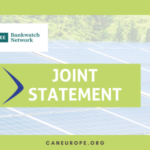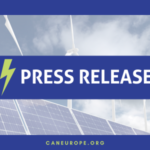Countries of Southeast Europe (SEE) waste much more energy than the members of the European Union, according to a new report published today by a group of civil society organizations from across the region [1].
Published in the final stage of adopting the Energy Efficiency Directive (EED) in the region, through the Energy Community framework [2], the report explains why the adoption of the EED is crucial for the countries of Southeast Europe.
Energy Community data shows that the most inefficient sector, buildings, could use from 20% to 40% less energy, if appropriate energy efficiency measures were implemented [3]. Furthermore, over 500 million EUR provided by international development organizations remain unused, “due to the lack of appropriate delivery mechanisms to link the local energy efficiency projects with the available financing.” [4]
Most of the SEE countries lag behind in meeting their current, non-binding target of 9% energy savings by 2018, which has been prescribed by the Energy Community framework. The adoption of the EED, scheduled for mid-October, with its set of binding measures to achieve a target of 20% savings by 2020, could be a game changer in the region. That is, as long as the countries make sincere efforts to implement it.
Maroš Šefčovič, Vice-President of the European Commission in charge of the Energy Union, provided the foreword of the report and encouraged Southeast Europe to reinforce its efforts on energy efficiency. “Energy efficiency is one of the key dimensions of the Energy Union. We need to fundamentally rethink energy efficiency and treat it as an energy source in its own right. The better use of energy while fighting climate change is both a spur for new jobs and growth and an investment in our collective future”, stated Šefčovič.
“The biggest barrier to energy efficiency is the total lack of political will to improve it amongst some of our elected representatives. It is disturbing when you compare how much is invested in coal that pollutes the air and contributes to climate change, and how much is being spent on energy efficiency that gives us warmer houses, local jobs and cleaner environment”, said Garret Tankosić-Kelly, principal of SEE Change Net.
“A balanced approach to energy policy that includes reducing unnecessary demand through energy efficiency improvements will bring vast benefits to SEE economies”, said Rod Janssen, the lead author of the report. “By creating the necessary policy framework for energy efficiency, the SEE countries can decrease individual energy costs and energy poverty, make businesses more efficient and reduce energy imports.”
“With the Paris climate summit on the horizon, the EU has a duty to encourage its neighbours to step up their efforts to save energy and thus protect the climate”, said Dragana Mileusnić, energy policy coordinator for South East Europe at Climate Action Network Europe. “Full adoption of the Energy Efficiency Directive in the Balkans is a crucial step in the reform of the Energy Community, which so far has failed to bring progressive climate policies to Southeast Europe.”
SEE SEP partner organizations:
SEE Change Net
Analytica (Macedonia*)
ATRC (Kosovo**)
CEKOR (Serbia)
CPI (Bosnia and Herzegovina)
CZZS (Bosnia and Herzegovina)
DOOR (Croatia)
EDEN (Albania)
Ekolevizja (Albania)
Eko-Svest (Macedonia*)
Forum for Freedom in Education (Croatia)
Fractal (Serbia)
Front 21/42 (Macedonia*)
Green Home (Montenegro)
MANS (Montenegro)
WWF Adria
CEE Bankwatch
Climate Action Network Europe
Contacts:
Ania Drazkiewicz, CAN Europe Communications Coordinator, ania@caneurope.org, +32 494 525 738
Dragana Mileusnić, CAN Europe Energy Policy Coordinator for South East Europe, dragana@caneurope.org, +32 2 894 46 82
Masha Durkalić, SEE Change Net Communication Officer, masha@seechangenet.org, + 387 33 213 716
Notes:
The report is available here
[1] The South East Europe Sustainable Energy Policy (SEE SEP) is a programme that has 18 CSO partners from across the region (Albania, Bosnia and Herzegovina, Croatia, Kosovo*, Macedonia**, Montenegro and Serbia) and the EU. The SEE SEP project aims to empower CSOs and citizens to better influence policy and practice towards a fairer, cleaner and safer energy future in SEE.
[2] The Energy Community brings together Albania, Bosnia and Herzegovina, Kosovo**, Macedonia*, Moldova, Montenegro, Serbia and Ukraine – and soon also Georgia – with the goal of creating a common energy market between the EU and some of its neighbours. It also aims to extend the EU internal energy policy to south east Europe and the Black Sea region. This includes the obligation for member countries to implement EU environmental law and renewable energy targets.
[3] The Energy Community Secretariat estimates that potential improvements are: Transport: 10%; Household sector: 10 – 35%; Public: 35 – 40%; Service sector: 10 – 30%; Industrial and commercial: 5 – 25%. They estimate that the potential yield (public buildings and private households): 805 million EUR in energy savings by 2020. ECS, Energy Community – Tapping on its Energy Efficiency Potential, 1 June 2015, p. 12.
[4] Energy Community Secretariat, Energy Community – Tapping on its Energy Efficiency Potential, 1 June 2015, p. 20.
* According to the UN, the official name for Macedonia is “The former Yugoslav Republic of Macedonia”.
** This designation is without prejudice to positions on status, and is in line with UNSCR 1244/99 and the ICJ Opinion on the Kosovo declaration of independence.
Climate Action Network (CAN) Europe is Europe’s largest coalition working on climate and energy issues. With over 120 member organisations in more than 30 European countries – representing over 44 million citizens – CAN Europe works to prevent dangerous climate change and promote sustainable climate and energy policy in Europe.
Our address: CAN Europe
{domain.address}
Unsubscribe here:
{action.unsubscribeUrl}



